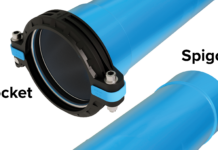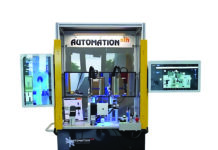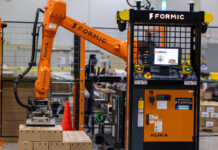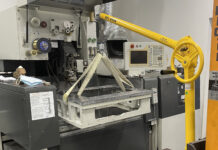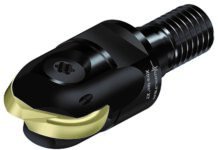To help manufacturers successfully navigate the post-pandemic economy, the Association for Manufacturing Excellence (AME) has released a recently published white paper titled “A Manufacturing Marshall Plan.” This all-important paper maps out exactly how today’s companies can prevent post-pandemic supply chain disruptions, advance their manufacturing productivity and reskill workforces.
A Manufacturing Marshall Plan advocates for reshoring, nearshoring and LeanShoring™ together with an increased focus on Industry 4.0 innovations and enhance educational and training offerings to create a stronger workforce. These three actions will provide companies and their communities with a distinct competitive advantage while also boosting productivity and improving sustainable resilience in a fast-changing competitive manufacturing world.
According to the white paper, the coronavirus pandemic is taxing the efficiency and cost benefits of a globalized supply chain system. And it recommends that a switch to a more robust domestic supply chain and advanced manufacturing base could reduce the dependence on the increasingly fractured global supply system.
Offshored supply chains cause long-distance transportation, increased communications obstacles, unpredictable delivery times resulting in the loss of manufacturing capacities and increased environmental pollution. Consequently, a trend known as reshoring or nearshoring – moving supply chain production to domestic or nearly domestic facilities – is gaining acceptance.
In response to current and future demands, and to avoid future supply chain disruptions and takeovers from global competitors, today’s companies must consider undergoing a supply chain renaissance, according to the white paper. To do this, they will have to implement new operational strategies and technologies, and the white paper discusses several resources for the establishment of these redeveloped domestic supply chains.
The establishment of these new domestic supply chains, however, means that manufacturers must increase productivity, efficiency, speed and quality to maintain competitiveness. All of which requires the digitalization of production. By pairing a connected environment of data, people, processes, services, systems and IoT-enabled industrial assets with the generation and use of actionable data, manufacturers can realize smart industries and ecosystems that foster innovation and collaboration. Unfortunately, the Industry 4.0 and this Digital Revolution creates additional demands for millions of new skilled jobs.
As the current workforce undergoes generational changes precipitated by retiring baby boomers, factories are evolving from the pre-automation plants of the past to the smart factories of the future. Workers in smart factories, according to A Manufacturing Marshal Plan, require digital fluency, technological savviness and data analytics know-how. Skills that previous generations did not require and that future generations often lack.
The white paper states that the development of a skilled workforce begins with motivating a higher quantity and quality of recruits and that the demise of vocational education at the high school level has bred a skills shortage in manufacturing today. To close the growing skills gap, groups of employers, community colleges, workforce agencies, intermediaries, youth programs, labor organizations, policy experts and others across the country are advancing apprenticeship and work-based learning strategies – outlined in the white paper – as workforce development and talent solutions for American businesses.
As the manufacturing industry moves into its “new normal,” failure to reshore, nearshore or leanshore manufacturing jobs, enhance industrial innovation and reskill the North American workforce leaves the continent susceptible to future supply chain disruptions and economic uncertainty. The three steps outlined in A Manufacturing Marshall Plan provide a solid start for manufacturers to prevent such supply chain disruptions in the future.
About the Association for Manufacturing Excellence
Since its founding in 1985, the Association for Manufacturing Excellence (AME) has grown into the premier not-for-profit organization for the exchange of enterprise excellence knowledge. The association’s 4,000 members come together through practitioner-to-practitioner experiences to explore lean thinking and other operational improvement methods, exchange best practices and network. Through engaging workshops, plant tours, summits and industry-leading conferences, AME members discover and implement new continuous improvement strategies in order to share, learn and grow.

